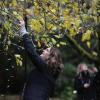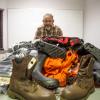April 24, 2007 - 6:12am
Tourism and Recreation Management students from five post-secondary institutions – including Malaspina University-College – want to help rural communities welcome the world to BC.
The students, led by Malaspina tourism professor Dr. Nicole Vaugeois, will participate in a three-week study tour in the central region of BC, April 27 to May 18. They'll share information with community leaders and tourism operators, and collect success stories to promote rural BC, especially during the 2010 Winter Olympics.
“Numerous individuals are working hard to develop tourism throughout rural BC,” said Vaugeois. “By capturing these stories and sharing them with others we can build on each other’s success.”
Six students, including Rachel Huber, Richard Crowley, Brad Goodwin, and Carolyn Mead from Malaspina, Maureen Massini of the College of New Caledonia in Prince George, and Randy Love of Thompson Rivers University in Kamloops, were selected to participate in this year's study tour.
“I’m excited about the opportunity,” said Huber, who graduates from Malaspina in June. “It’s a great way to take the theory and practical knowledge we’ve learned in the classroom and apply it in a real life situation.”
The tour starts in Kamloops, and includes stops in Golden, Revelstoke, Chase, Salmon Arm, Clearwater, Valemount, Blue River, McBride, Mackenzie, McLeod Lake, Wells, Quesnel, Barkerville, Likely, Williams Lake, Tattla Lake, Tatleoko Lake, Clinton and Ashcroft.
Rural communities play an important role in the economic and social health of BC and Canada, said Malaspina faculty member Dan McDonald, who will accompany the study tour. But many rural communities are struggling to survive as they switch from primary resource-based industries such as mining, forestry and fishing to tourism related initiatives. Tourism can help revitalize these communities, but some rural towns and cities don't have the resources or information they need to develop tourism in a sustainable way.
"This is where we can help," said Vaugeois. "Tourism students participating in the study tour can act as information conduits. As new and upcoming tourism professionals, they have the knowledge, training and opportunity to help small communities make successful transitions and improve their economic standing and quality of life through rural tourism development. Hopefully, our students will empower residents, community and business leaders in rural communities to cultivate vibrant, sustainable futures with innovative tourism and recreation initiatives."
According to Statistics Canada’s Rural and Small Town Analysis Bulletin, in 2005 Canada’s rural regions were visited by half of Canadian visitors, 39 per cent of American and 33 per cent of overseas visitors. While interest in rural areas is expected to increase during the 2010 Olympics, BC rural communities are in varying stages of readiness, added McDonald.
The study tour, part of a three-year initiative called the Tourism and Recreation Innovation Project (T.R.I.P.), is one method being used to reach out to rural communities developing tourism.
Malaspina coordinates T.R.I.P. on behalf of the University of Northern BC (Prince George), College of the Rockies (Cranbrook), Thompson Rivers University and College of New Caldonia, explained Vaugeois. Other partners include Tourism BC, BC Parks, Ministry of Tourism Sport and the Arts, Ministry of Economic Development, the BC Centre for Tourism Leadership and Innovation and the Canadian Rural Secretariat. T.R.I.P. partners pooled $600,000 from various government agencies, including the Social Sciences and Humanities Research Council of Canada (SSHRC), to work with rural communities to incorporate tourism as a form of economic development.
Vaugeois led a similar T.R.I.P study tour last year through northeastern BC, Alberta and the Northwest Territories. Next year, she'll lead a tour through southern BC.
Just as one goal of the project is to make students more aware of issues and opportunities in rural communities, Vaugeois hopes the work completed through T.R.I.P. will influence government policy makers.
“Decision-makers working in urban areas often don’t get the opportunity to visit rural communities,” she said. “Insights gained from our study tours will be shared widely with communities and the public in various ways including workshops, and case studies, all of which are available on our website. It’s exciting to be part of this work, knowing that it might make a difference.”
Tags: In the Community






